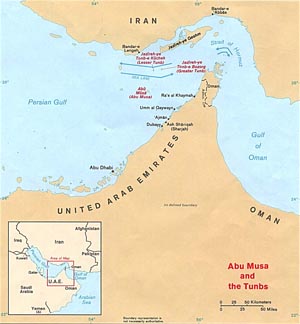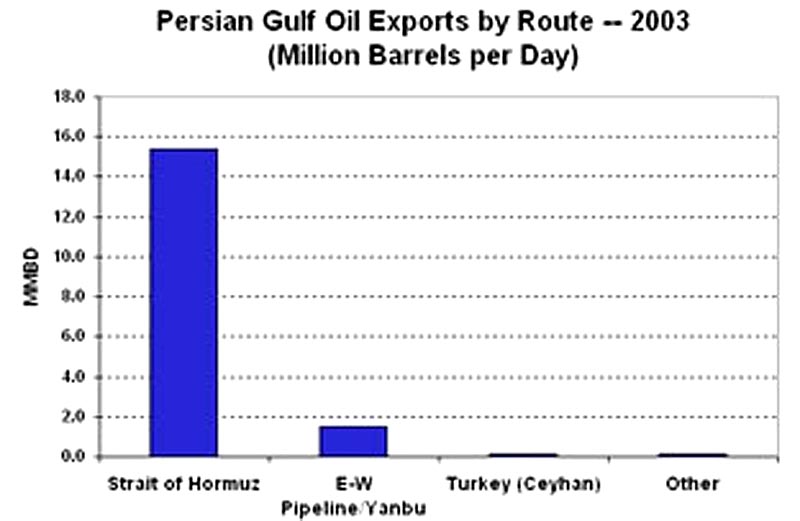“Third-rate men, of course, exist in all countries, but it is only here that they are in full control of the state, and with it of all the national standards.” — H. L. Mencken
Hard on the heels of the Cheney hunt for Republican lawyers, we now have the Great DP-World Port Controversy.
Democrats like Hillary Clinton and even some Republicans are in full posture mode, asking “tough” questions about the “Arab takeover” of the homeland’s ports, which will allegedly have us moving Bin Laden’s dirty bombs into the country in containers at the connivance of United Arab Emirates (UAE) cargo managers.
This has given George Bush the opportunity to posture himself in turn, as the staunch defender of Arab rights, holding the line against a bunch of anti-Muslim opportunist politicians.
Truly this is a carnival worthy of Mencken’s pen.
There are serious military, economic, and political interests at stake, however.
Click on the map for a larger view. SOURCE: Perry-Castañeda Library Map Collection, The University of Texas at Austin Click on the chart for a larger view. |
The United Arab Emirates is located directly across the Strait of Hormuz from Iran. In fact, the UAE has an ongoing dispute with Iran over the ownership of three islands in the strait, the key chokepoint for world oil shipping which transits 13 million barrels per day, more than 30% of the total oil shipped on tankers daily and nearly 90% of Persian Gulf oil exports. This makes it incredibly important to Pentagon strategists.
The UAE produces around 2.5 million barrels of oil a day, which, at current world prices, gives its rulers the cash to buy boatloads of military equipment. 80 US F-16 fighters are currently being delivered to the UAE. These fighters and other UAE military buys are paid for in hard currency.
Indeed, the UAE is one of the few countries in the world that is running a trade deficit with the USA.
Boeing is in the midst of lucrative contracts current and future to sell the UAE state-of-the-art passenger planes. According to Boeing’s VP for sales Lee Monson, “[W]e had great orders last year from Emirates for 42 aircraft as well as new orders from Egypt, Libya and Pakistan.” Boeing faces hard competition from Airbus in the UAE and the region.
Then there is energy. While the UAE’s oil production shows signs of decline, it is noted for its light crude, which is easier to refine and thus highly prized. The US oil industry has stakes in it. To take just one example, the Abu Dhabi National Oil Company brought in ExxonMobil in June 2004 as a strategic partner to develop the Upper Zakhum field, giving it a 28 percent ownership stake.
So, with the UAE’s strategic geographical location in the event of a military showdown with Iran, its oil revenues giving it purchasing power for US military and aviation hardware, its aging oil infrastructure seeking aid from companies like Exxon, and its investors providing the capital for the venerable UK P&O port management firm, we can see that it is a key player in the scheme of things in the Middle East, a player that the US imperium can ill afford to alienate.
The psychotic, chauvinist, and racist atmosphere created in the US after September 11, however, tempts politicians of both parties, particularly Democrats who want to appear stronger and more right-wing on “homeland defense” than Bush. Their paymasters in the boardrooms may soon remind them who pays the bills. I suspect that, as this realization sinks in, the Democrats will quietly shelve their rhetoric and get with the imperial program.
Such are the contradictions at work in the US today. The poison in the domestic political atmosphere necessary for wars of aggression like Iraq suddenly threatens to trip up billions of dollars of potential business. It’s another sign of an empire in decline, with the parties in charge unable to shoot any straighter than VP Cheney after a three-cocktail lunch.
Jon Flanders is a member and former president of IAM LL 1145 and a member of the Troy Area Labor Council, AFL-CIO.


